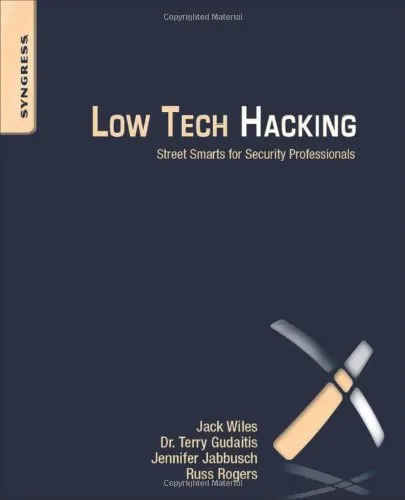Low Tech Hacking: Street Smarts for Security Professionals
4.5
Reviews from our users

You Can Ask your questions from this book's AI after Login
Each download or ask from book AI costs 2 points. To earn more free points, please visit the Points Guide Page and complete some valuable actions.Introduction to "Low Tech Hacking: Street Smarts for Security Professionals"
In an age dominated by technology and intricate cybersecurity systems, "Low Tech Hacking: Street Smarts for Security Professionals" stands out by addressing the human and practical aspects of digital security. Written by experts Jack Wiles, Terry Gudaitis, Jennifer Jabbusch, Russ Rogers, and Sean Lowther, this book takes an unconventional yet highly effective approach to highlight the vulnerabilities present not in the systems themselves but in the people and processes surrounding them.
The book delves deep into the world of low-tech hacking techniques, offering practical advice, real-world anecdotes, and pragmatic strategies for identifying and mitigating potential security threats. This guide demonstrates that while sophisticated technology safeguards are essential, the weakest link in any security framework is often human behavior and low-tech exploitation. Whether you're an IT professional, a penetration tester, or simply someone curious about how these types of hacks occur, "Low Tech Hacking" provides valuable insights, tools, and methods to understand how attackers think—and how to counteract them.
Detailed Summary of the Book
"Low Tech Hacking" begins by breaking down what the term "low tech" means in the world of cybersecurity. The authors argue that cybercriminals often bypass sophisticated defenses by leveraging social engineering, physical security manipulation, or low-tech tools that exploit human error and oversight. While advanced technological breaches make headlines, low-tech attacks can be just as devastating.
The book is divided into different sections, each addressing a core area of concern. Topics include:
- Social engineering: How attackers manipulate people into divulging sensitive information.
- Physical security: Exploiting overlooked aspects of on-site protections.
- Dumpster diving: Extracting private data from discarded documents and hardware.
- Lock picking: A primer on how attackers often gain physical access to secure spaces.
- Network reconnaissance: Gathering information through low-tech and lesser-detected strategies.
Through real-world scenarios and instructive examples, the authors walk readers through how these methodologies are used in day-to-day hacking attempts. Most importantly, this book doesn't just highlight vulnerabilities—it provides actionable advice on how to strengthen defenses.
Key Takeaways
"Low Tech Hacking" is a treasure trove of actionable tips and insights for security professionals. Some of the key takeaways include:
- Technology alone cannot offer 100% security. Humans are often the weakest link in cybersecurity chains.
- Low-tech attacks, while seemingly unsophisticated, are extremely effective and require equally creative counter-strategies.
- Practical skills, such as identifying phishing attempts, protecting discarded data, and securing physical access points, are critical in deterring attacks.
- Security requires a blend of technical expertise, street smarts, and constant vigilance.
- Understanding an attacker's mindset is crucial in developing proactive defenses for any organization.
From executives to IT specialists, anyone working within or dependent on digital and organizational security can benefit from the information presented here.
Famous Quotes from the Book
Throughout its chapters, "Low Tech Hacking" delivers thought-provoking statements and observations. Here are a few notable quotes from the book:
"Hackers are not just criminals looking for profit; they are problem solvers exploiting real-world weaknesses."
"The best lock is only as good as the person who uses it. Complacency is a hacker’s greatest asset."
"Data that you throw away can be data that someone else treasures."
These quotes demonstrate the book's core themes, urging readers to think critically about the broader dimensions of security and responsibility.
Why This Book Matters
"Low Tech Hacking: Street Smarts for Security Professionals" fills an often-overlooked gap in the cybersecurity industry. While countless resources focus on high-level technical solutions, fewer deal with the simpler, more human side of security issues. This book serves as a beacon for professionals who understand that safeguarding data and systems is not solely about complex algorithms or expensive firewalls. Instead, it’s about considering every angle—from digital vulnerabilities to physical access points, from employee mistakes to overlooked waste materials.
By shedding light on the unconventional yet highly effective methods attackers use, the authors remind readers that vigilance, awareness, and a multi-faceted approach to security are key to staying ahead in an ever-evolving threat landscape. The lessons within these pages will resonate not only with security professionals but with anyone who values the importance of protecting their assets.
In summary, this book is essential reading for anyone who recognizes that no system, no matter how advanced, is foolproof, and that sometimes the most effective solutions are the simplest ones.
Free Direct Download
Get Free Access to Download this and other Thousands of Books (Join Now)
For read this book you need PDF Reader Software like Foxit Reader


